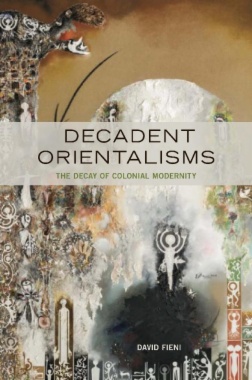

Decadent Orientalisms presents a sustained critique of the ways Orientalism and decadence have formed a joint discursive mode of the imperial imagination. Attentive to historical and literary configurations of language, race, religion, and power, Fieni shows the importance of understanding Western discourses of Eastern decline and obsolescence together with Arab and Islamic responses in which the language of decadence returns as a characteristic of the West.
Taking seriously Edward Said’s claim that Orientalism is a “style of having power,” Fieni works historically through the aesthetic and ideological effects of Orientalist style, showing how it is at once comparative, descriptive, and performative. Orientalism, the book argues, relies upon decadence as the figure through which its positivist scientific claims become redistributed as speech acts—“truths” that establish dominance. Rather than attending to Orientalism as a repertoire of clichés and stereotypes, Decadent Orientalisms considers the systemic epistemological consequences of the diffuse, yet coherent network of institutions that have constituted Orientalism’s power.